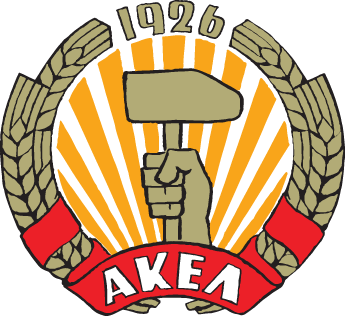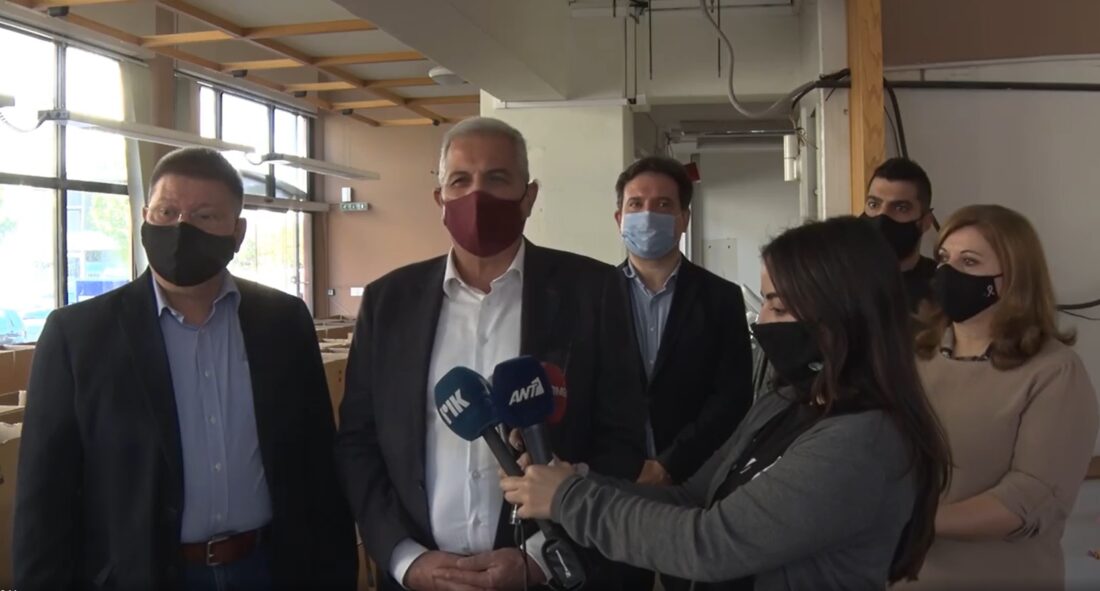Greeting of the General Secretary of the C.C. of AKEL Andros Kyprianou at the presentation of the book of D.Christofias “How need turns into history”
AKEL C.C. Press Office, 23th November 2016, Nicosia
 First of all, I would like to congratulate comrade Demetris Christofias for writing his book.
First of all, I would like to congratulate comrade Demetris Christofias for writing his book.
I would also like to thank him warmly for the honor in the invitation extended for me to address its presentation here today.
I accepted his invitation without any second thoughts.
First, because Demetris Christofias was for over twenty years our leader. He was the leader of a mass party with deep roots in Cypriot history and society. A Party that waged fierce struggles and withstood equally tough trials, forging unbreakable ties that connected it and continue to connect it with our people. A Party which under his leadership was led to the highest post of the Republic of Cyprus, managing to achieve what until then was considered unmanageable.
Second, because the book of Demetris Christofias is a historically significant testimony of critical events our suffering country went through. This is a valuable book which one can read in one night, but one which will return a life. It not only includes events as D.Christofias had lived them, but also his own views, interpretation and assessments about all that happened, but also about all that is coming.
Whether one agrees or disagrees with what AKEL supports, one cannot deny that our Party has been identified with the path of this country. It has shed its blood to defend the interests of Cyprus and contributed decisively to unquestionable social, political and labour rights being won. A Party that constitutes an integral part of our country’s social and political progress; that did not yield and stood firm during extremely tough times which determined its continuity and consistency. It rose to the challenge by fully assuming its responsibilities, even when facing insurmountable difficulties.
During the years of the dissolution of the Soviet Union and the crisis within AKEL, the Party managed under extremely difficult and grave conditions, to develop the People’s Movement of the Left and our country to progress by overcoming all kinds of adversities.
In these conditions, comrade Demetris Christofias and the Party leadership back then not only overcame the difficulties that for other parties were fatal, but managed to establish it as a considerable powerful political force.
Comrade Demetris had, what is more, stated once that “we succeeded because our hearts were filled with ideals and values that are above all focused on the common people … We overcome adversities because we were next to the toiling people of labour, the ordinary working people fighting for a living wage, next to the office worker and the teacher. We stood firmly on their side as fellow companions in the struggle and as comrades, but never as aloof preachers detached from their daily experiences.”
And it is an undeniable truth that c. Demetris Christofias taught all of us to give more and work as he did, that is day and night. He taught us what it means to defy fatigue and illness. He taught us what it means to put the “collective” over and above the “personal”. Together with the rest of the AKEL comrades he opened up new paths, setting the example of constant renewal. In this sense he did indeed honor the history which he wrote as the youngest leader of a Communist Party across Europe.
Of course, the renewal which his election to the leadership of the Party represented did not start, nor did it stop with the positive factor of young age. The development of internal party democracy, the diverse and multifaceted activities of the People’s Movement of the Left, his presence and contribution to the political, social and cultural life of the country in an innovative and radical way, bear the seal of the twenty-year presence of c. Demetris in the leadership of AKEL.
His election to the Presidency of the House of Representatives and subsequently to the post of President of the Republic was not accidental. It was not just an acknowledged vindication for an AKEL militant who for the first time rose to the highest public posts. His term in the Presidency of the House of Representatives promoted parliamentary diplomacy to another level. The institutional role of Parliament and its daily political functioning was upgraded. Democracy in our country took steps forward.
His term in the Presidency of the Republic coincided with the huge financial crisis that erupted internationally. The tackling and consequences of the crisis were the main axis of a fierce campaign which the then opposition launched against him. The other axis of a targeted campaign were the developments surrounding the Cyprus problem. The unprecedented attack for Cyprus’ political life that was unleashed against him personally, and therefore against all that AKEL represented, was primarily ideological. It was directly related to answers on key, strategic questions: who should pay the consequences of the economic crisis? What our patriotic choice be on the Cyprus problem: should we opt for half a state, but one that is purely Greek or for whole united and a bicommunal state?
Whether one agrees or disagrees with the handlings that were made during the Christofias administration one should acknowledge the significance of certain historical characteristics it had. During the Christofias governance unifying proposals on several aspects for the solution of the Cyprus problem were submitted. Back then we, as a political spectrum, undertook the full burden of this cause. We defied the political cost and supported the steps that were taken, thanks to which we can today hope for a just solution.
The convergences that were recorded during that period today form the basis of the ongoing efforts. Let’s hope they lead to a successful outcome.
However, in any case, during the Christofias period truths were spoken, that were being stated for the very first time by a President of the Republic. Others censored these truths. Others were pushing them systematically under the carpet for entire decades.
The truth was told that Cyprus hides in its bowels the remains of Greek Cypriots, but also Turkish Cypriots too, both victims of a blind nationalism.
The truth was also told that for Cyprus to move forward we must overcome the ethnic confrontation between Greek Cypriots and Turkish Cypriots; that both communities must cooperate with each other on a political basis.
Finally, the truth was said that Cyprus was paying the price of the rhetoric of the balconies in order to appease people, while behind closed doors the opposite was being agreed in the people’s absence.
Today we must add another truth. When the economic model according to which the banks functioned was exhausting its limits by undermining the real economy and leading to an unprecedented crisis, the Christofias government opened another window: that of energy. It paved, that is, the way of overcoming the deadlock to which the Cypriot economy had been plunged into by turning at the same time our country’s natural wealth into a factor for peace for our country and people’s prosperity. In addition, in the conditions of an economic crisis, it marked out a “red line” of resistance and protection of the working people and all those in need.
Today looking at that period at some distance, we can all make more calm and sober assessments. Now everyone admits that it wasn’t the pensioners, who were receiving the Easter bonus or the single parents who received public assistance, that were to blame for the situation of the Cyprus economy.
Ultimately, despite the attacks that were waged from the outset of the Christofias Presidency, when reviewing its performance indisputable work had been recorded, such as radical changes and reforms in education and local government, as well as in social policy, on the water issue, the environment and much more.
Today I am not going to talk extensively about this work. This is the task of history and he will be judged by it. It won’t will be judged by those who for their own reasons are trying, even today, to trap public debate in a sly and barren resort to the past. I shall simply take this opportunity to make five political observations:
- The Christofias government has already been judged politically by the people. This chapter had closed or should have closed with the 2013 presidential elections. History will now be the judge. It is to history that the past belongs. It will assess the events that have marked it. It will search for the truth that is hidden behind these events and will apportion responsibility for developments where they actually belong, depending on the role everyone played, whether in the case of the Mari blast, or in case of the collapse of the banks and the economy.
- What should now be judged is the work of Mr. Anastasiades. What is now at stake is the future of Cyprus. Those who insist on referring to the past are evidently those who do not have or want to hide their own plans for the future. They are the ones shifting on to AKEL and President Christofias the sole responsibility for the misery due to the imposition of the Memorandum, aiming at their own responsibilities being forgotten, as well as those of the well-known economic establishment for undermining the banking system and the economy.
- AKEL is a mass, responsible and historic party committed to its principles. It has paid a heavy price and made bloody sacrifices for the sake of defending the interests of the people and the country. It has overcome much greater adversities and gone through far greater tests. It has learned to take responsibility and has never hesitated to recognize bravely and frankly its own mistakes, to proceed with boldness and courage to make its own self-criticism. However, it will not be doing any favor to any of those circles and forces who are seeking to trap it by entering into a game of misguiding public opinion, into a game of confusing what is at stake on which citizens should turn their attention to. AKEL has nothing to hide and nothing to fear. On the contrary, it is aware of its mission and fully recognizes the dangers our country is currently facing acting without a national alternative plan and without the necessary social cohesion and participation. The errors are not corrected by new bigger mistakes. The biggest mistake now would be an unproductive debate about the past, while the real dilemmas concern the very future of the Cypriot people.
- The denigration and defamation of Demetris Christofias and the questioning of the moral advantage AKEL always had are an obvious target of those circles and forces who want to see the Left in the corner marginalized again, discredited in the eyes of the people and isolated from the other democratic forces. This was evident on the eve of the May parliamentary elections when they tried unsuccessfully to link members of AKEL with the supposed scandal of Koshi and Paphos. This is also now the case as we are nearing municipal elections in the way in which the charge filed by Miltiades Neophytou against Demetris Christofias is being portrayed. It is revealed in the way in which the book of the late Costas Papacostas was projected, which was a slap in the face for today’s government and ruling forces. In doing so, they are attempting to deprive the people of the hope of an alliance of political forces that reject the dead-end policy of neoliberalism, which believe in solidarity, are struggling for more equality, sustainable development and a more advanced democracy. We are not going to play their game. We will not behave dishonestly towards Demetris Christofias, a man who made his life a part of our own history and who led for twenty years our Party; who led it to power at the head of a broad political alliance. We will struggle to preserve our moral advantage, honoring and not devaluing our history, learning from our mistakes but refusing to turn them into a pretext for our opponents.
- We have chosen to correct our course by changing direction where needed in practice and not in words, together with society and not against it, in the real life and not inside any closed offices. The municipal elections are for us the beginning of a new path towards the people, the opportunity for new contacts with the local communities, a new agreement with active citizens, the young generation and healthy entrepreneurship. The municipal elections can be the starting point for a joint effort to build local government as a means of rationalizing the state, democratizing institutions to serve the people, improve people’s quality of life and participation in the continuous improvement of people’s everyday life, the functionality and effectiveness of the mechanisms of solving concrete problems with specific priorities and defined good practices.
The book of D. Christofias doesn’t just refer to the five years of the country’s governance. It concerns the course of a man that was born and raised of the working class in the political affairs of our country. It concerns his personal testimony of how he lived the major events of the last decades. It relates to the experiences, life practice and conclusions of a process of more than fifty years at the forefront of political life. It concerns the invaluable legacy not of a man, but of an entire political spectrum, the most historic political force of Cyprus. One needs only to think about the key points of Cypriot history to understand this. When, for example, other circles and forces cultivated the illusion of the “desirable” solution, others spoke first about the feasible solution. When others were spreading hatred and frenzy with the slogan “Mother Greece embrace us too” AKEL opened up the road to rapprochement of Greek Cypriots and Turkish Cypriots. For independence to be considered today as a gain of the Cypriot people, for rapprochement to be recognized as official policy is the result of AKEL’s consistent policy. The evolution of this course is reflected in a meaningful and vivid way in the book.
Perhaps this explains the intensity and breadth of the obsession and intensity of the attacks launched against D. Christofias and AKEL. Faced with the awkwardness of vindication, the voices of these attacks are growing; voices who believe they have the answer to the question “how history becomes a silence”. Perhaps at some stages in history they may manage to hide the truth, but this will always eventually emerge and pass them by, because before the History they want to become silent, “the need that becomes History” always precedes. They will always be overtaken by those with the working hands of labour opening up paths, those who according to the poet, are carrying on their backs all the dreams and ideals of the people.
They are the ones who make History and they will vindicate it anyway, sooner or later.




